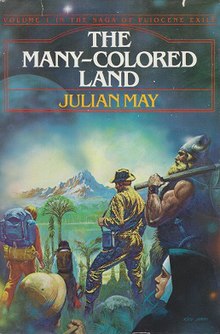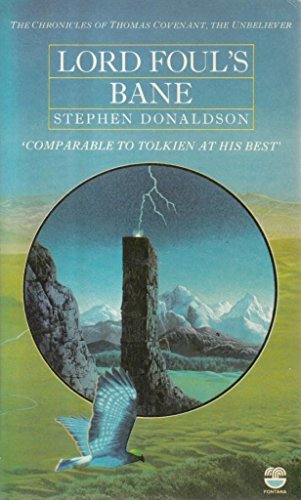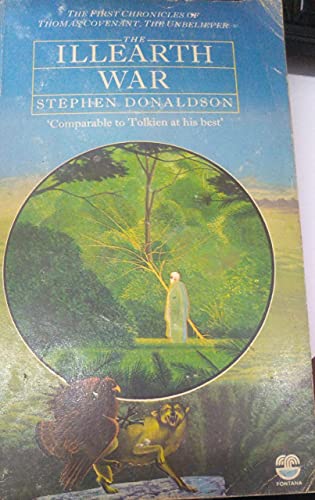The Many-Colored Land – Summary
The Many-Colored Land is the first book in Julian May’s Saga of Pliocene Exile series. Set in the 22nd century, the story revolves around a group of misfits and adventurers who choose to travel through a one-way time portal to Earth’s Pliocene epoch, six million years in the past. The novel begins by introducing the diverse cast of characters, each with their own reasons for seeking exile in the past, ranging from personal traumas to a desire for adventure.
The story is divided into three main parts. The first section introduces the members of ‘Group Green’, the latest batch of time travellers, and explores their motivations for leaving the technologically advanced 22nd century. The second part follows their journey through the time portal and their initial experiences in the Pliocene era. However, instead of finding an uninhabited wilderness, they discover that the past is already occupied by two alien races: the Tanu and the Firvulag.
The Tanu, a tall, handsome race with powerful psychic abilities, have established a feudal society and use the human time travellers as slaves or subjects. The Firvulag, their dwarf-like enemies, possess their own supernatural powers and live in the forests. The human newcomers find themselves caught in the middle of the ongoing conflict between these two alien races.
As the story progresses, the members of Group Green are separated and face various challenges. Some are taken captive by the Tanu, while others manage to escape and form alliances with the Firvulag. The final part of the book culminates in a rebellion against the Tanu, with the humans playing a crucial role in the conflict.
Throughout the novel, May expertly weaves together elements of science fiction and fantasy, creating a unique and immersive world. The book explores themes of adaptation, power dynamics, and the consequences of advanced technology while also delving into the personal growth and relationships of its characters.
Key themes:
- Time travel and its consequences
- Clash of civilisations and cultures
- Power dynamics and social hierarchies
- Adaptation and survival in a hostile environment
- Personal growth and redemption
- The impact of advanced technology on society
Character Details
Elizabeth Orme
Elizabeth is a former metapsychic practitioner who lost her abilities after a severe injury. Unable to cope with this loss, she decides to travel to the Pliocene era. Elizabeth is resilient and adaptable, using her experience and intelligence to navigate the challenges of the past. Her journey is one of rediscovery and finding new purpose in a world where her former skills are no longer applicable.
Bryan Grenfell
Bryan is an anthropologist from the Galactic Milieu who travels to the Pliocene in pursuit of his love, Mercy. His academic background and curiosity make him a valuable asset in understanding the alien cultures they encounter. Bryan’s refusal to wear a torc (a device used by the Tanu to control humans) sets him apart and allows him to maintain his independence. His romantic quest adds an emotional depth to his character and drives his actions throughout the story.
Stein Olsen
Stein is a former driller with a troubled past, haunted by the death of his mother. His imposing physique makes him an immediate target for the Tanu, who want him to compete in their ritual combat. Stein’s character arc involves overcoming his psychological scars with the help of other characters, particularly Elizabeth and Sukey. His journey of healing and finding love adds a touching subplot to the main narrative.
Claude Majewski
Claude is a retired, widowed palaeontologist who sees the time travel opportunity as a chance to study prehistoric life firsthand. His scientific knowledge and experience make him a valuable member of the group, providing insights into the Pliocene environment. Claude’s character represents the pursuit of knowledge and the excitement of discovery in the face of unexpected challenges.
Aiken Drum
Aiken is described as an incorrigible rogue, bringing a mischievous and unpredictable element to the group. His quick wit and adaptability make him a key player in navigating the complex political landscape of the Pliocene. Aiken’s character often provides comic relief while also demonstrating cunning and resourcefulness in difficult situations.
Felice Landry
Felice is a young female athlete, specifically a ring-hockey player. Her physical prowess and competitive nature make her a formidable presence in the group. Felice’s character often grapples with the challenges of adapting her athletic skills to survival in a prehistoric world, while also dealing with her own personal demons.
Reader Fit
The Many-Colored Land would appeal to readers who enjoy:
- Complex, multi-layered science fiction and fantasy narratives
- Exploration of both futuristic and prehistoric settings
- Character-driven stories with a diverse ensemble cast
- Themes of adaptation, survival, and cultural clash
- Imaginative world-building that blends scientific concepts with fantastical elements
Fans of authors like Ursula K. Le Guin, Arthur C. Clarke, and even J.R.R. Tolkien may find this book particularly engaging due to its blend of science fiction and fantasy elements, coupled with its deep world-building and character development.
CEFR Classification and Learning Suitability
Estimated CEFR Level: C1 (Advanced)
The Many-Coloured Land, the first book in The Saga of Pliocene Exile series, presents a richly detailed science fiction narrative that requires advanced English skills.
- Vocabulary: The novel features specialised scientific and historical terminology, alongside literary and descriptive language, demanding a broad and precise vocabulary.
- Grammar and Structure: Sentences are often complex, with multiple clauses and narrative shifts. The prose combines action with detailed exposition, requiring careful reading.
- Themes: The book explores time travel, politics and human nature with intricate plotting and character development, adding layers of complexity for the reader.
- Dialogue and Style: Dialogue ranges from natural to formal, fitting the variety of characters and settings. The style is immersive and detailed, often dense.
Recommendation:
This book is suitable for advanced learners who enjoy science fiction and are prepared to engage with detailed, sophisticated language and complex themes.
Quick Facts
- Genre: Science Fiction/Fantasy
- Publication Year: 1981
- Reading Time Estimate: 12-15 hours (based on average reading speed)
- Notable Awards: Locus Award for Best Science Fiction Novel (1982)
Related Books
- “Hyperion” by Dan Simmons – Another science fiction epic with a complex narrative structure and diverse cast of characters.
- “The Mote in God’s Eye” by Larry Niven and Jerry Pournelle – A classic of science fiction that deals with first contact and alien civilisations.
- “Dune” by Frank Herbert – A seminal work of science fiction that blends complex world-building with themes of power, politics, and adaptation to hostile environments.


